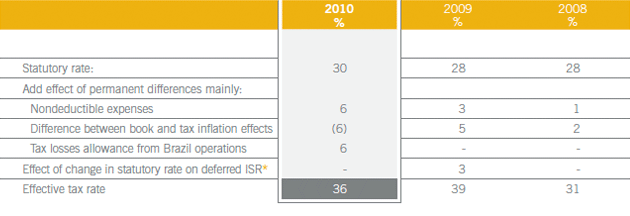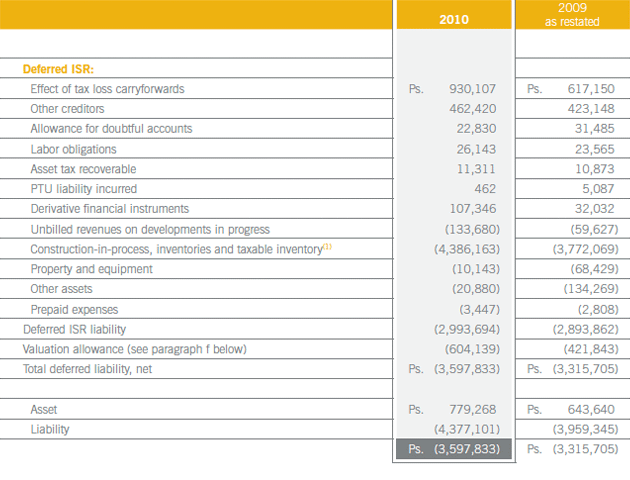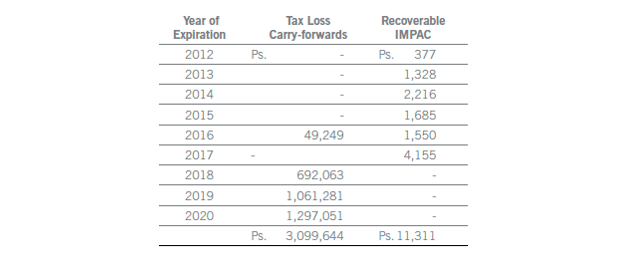Years ended December 31, 2010, 2009 and 2008
Desarrolladora Homex, S.A.B. de C.V. and Subsidiaries
Notes to restated consolidated financial statements
for the years ended December 31, 2010 and 2009
(Figures in thousands of Mexican pesos (Ps.), except as otherwise indicated)
24. Income tax, asset tax and Flat Rate
Business Tax (IETU)
In accordance with Mexican tax law, the Company is
subject to income tax (ISR) and Flat Rate Business Tax
(“IETU”) and files its tax returns on an individual entity
basis and the related tax results are combined in the
accompanying consolidated financial statements. The
ISR is computed taking into consideration the taxable
and deductible effects of inflation, such as depreciation
calculated on restated asset values. Taxable income is
increased or reduced by the effects of inflation on certain
monetary assets and liabilities through the inflationary
component, which is similar to the gain or loss from
monetary position.
The Company files ISR and IETU tax returns on an individual
entity basis and the related tax results are combined
in the accompanying consolidated financial statements.
On December 7, 2009 a tax reform bill was approved
and published, which reformed, amended and annulled
certain tax dispositions that were effective on January
1, 2010.
This tax reform bill enacted an ISR rate increase that is
to be effective as follows:
a) for years 2010 to 2012, 30%;
b) for year 2013, 29%; and
c) for year 2014 and future years, 28%
In addition, certain changes to the consolidation regime
are effective. However, the Company is not subject to
such regime.
The IETU of the period is calculated applying the rate of
17.5% (16.5% for 2008, 17% for 2009 and 17.5% for
2010) based on income determined by cash flows less
authorized credits.
The credits for the IETU are mainly composed of unamortized
negative IETU base, salaries and social security
contributions, and deductions from assets such
as inventories and fixed assets, during the initial transition
period.
The payment of IETU is required only to the extent that it
exceeds the ISR for the same period. The ISR paid during
the period will reduce the total IETU payable for the
same period.
When the deductions exceed the accumulated income
(negative IETU), no IETU is levied. The amount of the negative IETU multiplied by the applicable rate, results
in an IETU credit, which can be offset against the ISR generated in the same period or against the IETU payable,
if any, within the next ten years.
Based on projected tax calculations in the future it is estimated
that the Company will be subject to the payment
of the ISR only.
a) As of December 31, 2010, 2009 and 2008 the
ISR consist of the following:

To determine deferred ISR as of December 31, 2010 and 2009, the Company applied the different tax rates that were
in effect beginning in 2010, to temporary differences according to their estimated dates of reversal.
The operations in Brazil generated loss before taxes of Ps. 711,389 and taxes of Ps.28,016 and they were computed
and paid under Brazilian Tax regulations.
b) The reconciliation of the statutory and effective ISR rates expressed as a percentage of income before the ISR is:

* The effect of change in the statutory rate on deferred ISR represented an additional charge in the consolidated statement of income for 2009 of Ps. 78,624.
c) At December 31, 2010 and 2009 the main items comprising the asset (liability) balance of deferred ISR are:

(1) In conformity with the Mexican Income Tax Law (MITLA) in force through December 31, 2004, the cost of sales was considered as a non-deductible
expense and inventory purchases and production costs were considered as deductible items. This tax treatment in the MITLA gave rise to a temporary difference
because of the difference in the book value of inventories and its corresponding tax value. Effective January 1, 2005, the MITLA considers cost of sales
as a deductible item instead of inventory purchases and production costs. The MITLA established transition rules to be followed to include the December
31, 2004 inventory balance into taxable revenue. However, as result of the interpretation of the transition rules established by the MITLA, the Company did
not include its inventory balance at December 31, 2004. Consequently, the Company recorded a taxable inventory as a deferred tax liability of Ps. 187,425
and Ps. 156,555 as of December 31, 2010 and 2009, respectively. This taxable inventory relates to the inventory item and tax law change described above
as it is the source of income on which the Company did not pay taxes.
d) As of December 31, 2010 the tax loss carryforward expiring in the following ten years amounted to Ps. 3,099,644.
i. The asset tax, used to be a minimum income tax, was payable based on 1.25% of the average value of most assets
net of certain liabilities. The balances as of December 31, 2010 and 2009 of the asset tax were Ps. 11,311 and Ps.
10,873, respectively.
ii. The loss carryforwards and recoverable IMPAC for which the deferred ISR asset and prepaid ISR, respectively, have
been recognized can be recovered subject to certain conditions. Tax loss carryforwards and recoverable IMPAC for
which the deferred ISR asset and prepaid ISR, respectively, have been recognized can be recovered, subject to certain
conditions. The amounts as of December 31, 2010 and expiration dates are:

Additionally for its Brazilian operations the Company has
accumulated tax loss carry forward that at December
31, 2010 amount Ps. 141,374. Due to the uncertainty
to recover these tax losses, an allowance for the total
amount was recognized as of December 31, 2010.
e) The Federal tax authority has the right to perform reviews
of the taxes paid by Mexican companies for a
period of five years; therefore tax years beginning with
2005 are subject to possible review.
f) The Company has taken certain positions in its annual
tax returns which are classified as uncertain
tax positions for financial reporting purposes. Specifically,
uncertain tax positions currently outstanding
relate to the Company’s interpretation of the MITLA
related to the inclusion of certain debts in the calculation
of the inflation adjustment, and the deduction of
land by real estate developers. As of December 31,
2009, uncertain tax positions result in Ps. 421,843
in deferred tax assets which have been provided for
through a full valuation allowance, and an additional
current liability in the amount of Ps. 248,781. As of
December 31, 2010, uncertain tax positions result
in Ps. 604,139 in deferred tax assets which have
been provided for through a full valuation allowance,
and an additional current liability in the amount of
Ps. 775,946.